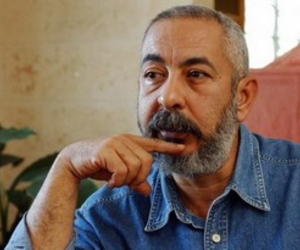Cuba is “Different” From Venezuela and the Ukraine
- Submitted by: lena campos
- Personalities
- 02 / 21 / 2014

Padura, one of the most internationally renowned Cuban intellectuals today, visiting Miami since last Sunday, believes that such factors as the social changes once legitimated in Cuba, the absence of high levels of violence and the inexistence of a political project by an organized opposition, prevent what is happening in Caracas and Kiev from taking place in Havana.
“The conditions haven’t come about. The conditions haven’t been allowed to come about,” Padura said during an interview with DPA in Miami, where he made several public appearances and compared Cuba to Venezuela and the Ukraine, countries currently shaken by vigorous anti-government protests.
“I believe this has prevented protests of this type, even when there are people who are more or less unhappy,” 58-year-old Padura stated. The author is critical of Raul Castro’s government but refuses to do politics through his novels.
Author of the best-selling The Man Who Loved Dogs and the more recent Heretics, Padura sees changes in Miami’s Cuban community and calls on the United States to take the next step and lift the embargo, a demand that is gaining strength in both Florida and Washington.
dpa: You were afraid to come to Miami before.
Padura: There was a time when there were people in Miami who were fairly aggressive with Cuban artists who came here. It would have been very unpleasant for me to have had someone accuse me of something that isn’t my fault. That said, the cultural and social perspective of Miami’s Cuban community has evolved a lot.
dpa: There are less and less hardliners in the émigré community and even anti-embargo currents in Miami. How does all this look to you from a distance?
Padura: The embargo is a political rather than economic mistake, even though, economically speaking, it affects the average Cuban most of all. It has been used by both sides as a pretext to keep tensions high. The day in which relations between Cuba and the United States become normal, it will be like waking up from a nightmare for Cubans living on the island and in Miami. The dragon that was devouring me was part of that nightmare.
dpa: Is the end of the “nightmare” in sight?
Padura: The times are better. There are reasons to think this is the best moment to overcome our differences. I see changes in the Cuban community here, there are changes taking place in Washington, in Havana, in the way people who live in Cuba think. If you add everything up, I think the result is rather promising.
dpa: What’s the next step and who is going to take it?
Padura: The United States should take the first step by assuming an attitude that is a bit more logical. If there are American companies selling products to Cuba, if there are so many businesspeople interested in investing in Cuba, if there are even Cuban-American businesspeople who have expressed an interest in establishing financial relations with Cuba, the step should be taken at this end, which is where the embargo is being maintained.
dpa: When will there be a political reform in Cuba?
Padura: It’s coming and, in fact, it’s already happening. This past month, during the Summit of the Community of Latin American and Caribbean States (CELAC), there were reports of dissidents who were detained for two or four hours. Before, they would have been detained for two or four years, the difference is notable. There’s more permissiveness in Cuba.
dpa: Are you, as a writer, an example of that permissiveness?
Padura: The fact I was awarded the National Literature Award is. A few years ago, no one would have thought it possible, because I am far from being a pro-government writer.
dpa: Is the liberalization process a mere cosmetic change, or do people believe in it?
Padura: I think things have changed. A process of change started in Cuba in the 90s. When I published my first novels about Mario Conde, I wasn’t the well-known writer I am today, and, still, the novels were published and got awards. They had fairly strong criticisms and nothing happened. Some writers are silenced more than others, are given less promotion than they deserve. I think this is a rather clumsy attitude on behalf of Cuba’s cultural policies.
dpa: Why do you pay tribute to heretics in your last novel?
Padura: Heresy is one of the forces that have moved humanity forward. If all of us had been orthodox, we’d be pretty screwed. Without breaking rules thought to be immutable, society would not have developed.
dpa: Are you a heretic?
Padura: I am a heterodox person, an anti-orthodox person, rather than a heretic. I haven’t been arrested enough to be a heretic. I try to think differently, I don’t like being forced to think as others want me to.
dpa: Why haven’t the kinds of things we’ve been seeing in Caracas and Kiev these days ever happened in Havana?
Padura: The conditions haven’t come about. The conditions haven’t been allowed to come about. There isn’t a political project in Cuba that could oppose the government, the dissident movement itself is divided and has been deeply penetrated by Cuban intelligence. Levels of violence in Cuban society have never been too high.
The fact things have never gone past a given point has, I think prevented protests of this kind, even though there are people who are more or less unhappy. I believe the Cuban project resulted in a true revolution. In the 60s, a different society was created, and it enjoyed the support of the majority at the time. Perhaps it doesn’t enjoy the same levels of support and acceptance today, but it created its own legitimacy. That makes it different from Venezuela and the Ukraine.
Source: Havana Times.org
Comments